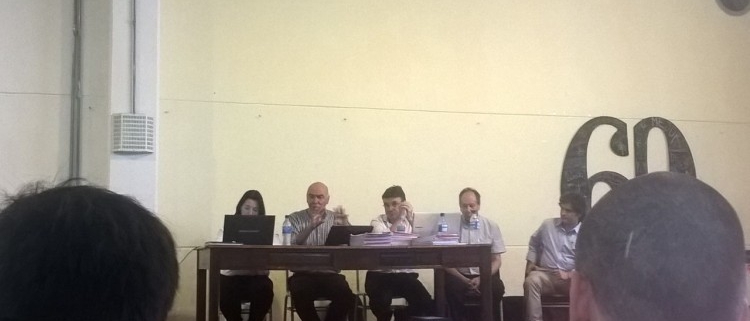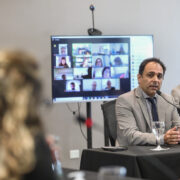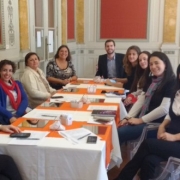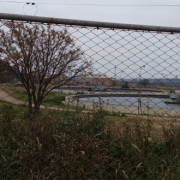Participation in the public hearing for the expansion of the Bajo Grande sewage plant
On Wednesday, December 7, the government of the province of Córdoba called a public hearing to announce the Environmental Impact Study (EIA) corresponding to the expansion of the current Sewage Treatment Plant (WWTP) And the construction of new main collectors. The participation of FUNDEPS included the presentation of a technical-legal report that marked certain inconsistencies identified when analyzing the EIA and knowing the antecedents of strong impacts in the zone.
“Below, we offer a google translate version of the original article in Spanish. This translation may not be accurate but serves as a general presentation of the article. For more accurate information, please switch to the Spanish version of the website. In addition, feel free to directly contact in English the person mentioned at the bottom of this article with regards to this topic”
With only three people registered, on Wednesday, December 7, 2016, a public hearing was held, convened by the Secretariat of the Environment and Climate Change of the province of Córdoba, whose purpose was to publicize the Environmental Impact Study (EIA) On the expansion of the Sewage Treatment Plant in the city of Córdoba. It should be noted that this process had little diffusion and was carried out very far from the area of influence more significant and more affected by the project (Barrio Chacras de la Merced). This fact violates the provisions of Art. 63 of Provincial Law 10.208 of Environmental Policy which establishes that these instances of participation must be carried out in the area most closely linked to the public decision in question.
The Bajo Grande Wastewater Treatment Plant (EDAR) plant was built at the end of the 1960s, on the banks of the Suquía River, and is located in the 2 ½ km of the road called Chacras de la Merced, at the eastern end of the City of Córdoba. It was inaugurated in 1987, being under the control and control of the Municipality of Cordoba in the year 1990. From the end of the nineties, the operation of the plant of Low Good EDAR was deteriorating, obtaining that today, the It has a limited capacity in the treatment of sewage, which generates a constant focus of contamination.
The problem of contamination of this plant is public knowledge by the presentation of complaints, lawsuits, news reports and even formal acknowledgments by officials of the province and the municipality of Cordoba. At a technical level, expert reports by the National University of Cordoba have determined that the treatment of cloacal liquids of Bajo Grande has important faults, both in the processing and in the operation of the equipment that it owns. This results in high contamination rates of the Suquía river, which directly receives the effluents generated by these deficiencies in the treatment. For some time, together with the organization Las Omas, we have been claiming for public information on health and environmental indicators that allow us to assess (and correct) this pollution situation.
From the above it is understood the need to invest in the current plant and to make the situation capable of being reversed. However, following the reading and presentation of the EIA, certain inconsistencies arise that, if not taken into account, far from improving the current situation of the plant, could aggravate the existing negative environmental impacts.
- In our brief presented during the hearing we emphasize some points:
- Inconsistencies regarding the treatment capacity of the plant.
- Inadequate treatment of environmental risks, in an area that has historically suffered the consequences of river pollution.
- Failure to strengthen control bodies in the city to facilitate the work of the Bajo Grande WWTP plant.
- Absence of plan for monitoring the work and mitigation of impacts.
Also during the hearing could be heard phrases such as: “… close to the sewage plant there are no stable populations,” calling into question the real commitment of government authorities to the residents of Chacras de la Merced and the problems In which they are immersed as a result of the malfunction of the plant.
From FUNDEPS, we consider that a thorough evaluation by the Ministry of the Environment as a comptroller of the present project is crucial, noting all the considerations set out during the hearing. Likewise, the necessary mechanisms must be available to comply with the expected legal and environmental parameters in order to protect the fundamental rights of the inhabitants of the city of Cordoba and in particular those of the district of Chacras de las Merced.
More information
Contact
Agustina Palencia, agustinapalencia@fundeps.org








